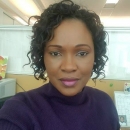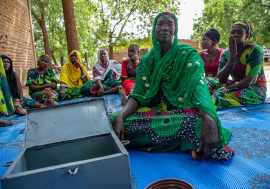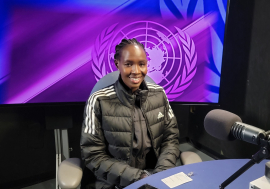Ms. Nell Bolton is the technical director for Equity, Inclusion and Peacebuilding unit at Catholic Relief Services’ headquarters in Baltimore, US. In Part II of her interview with Africa Renewal’s Zipporah Musau, she explains why equity and inclusion are important for cohesive societies: Here are excerpts from the interview:

Why is equity, inclusion and peacebuilding important in society today?
Thriving societies begin with social cohesion, justice, inclusion, and participation.
For sustainable development to happen, people have to be able to listen to one another, trust one another enough to come together and work together and collaborate towards their common aims, and for everyone's voice and participation to count in that process. This is how we are approaching our work.
We have made it a priority to support people and communities to be able to address what divides them so they can find what unites them, and together, work towards transformational change.
We found this to be important because we know that the biggest challenges facing our world today - poverty, disease, climate change - are not going to be solved by individualism. They will not be solved by opposing factions, or by prioritizing one group to the exclusion of another. Problems have to be addressed collectively.
We are prioritizing integrating a social cohesion and a justice perspective across all our programmes.
Running humanitarian and development, as well as peacebuilding programming in such an integrated way is an approach that gets transformational results across all sectors. It is operationalizing, and seeing the benefits, of working across the humanitarian development and peace nexus.
How important is equity, inclusion, equity, and cohesion in any society?
We see these issues as foundational to the ability of people and communities to thrive, and to pursue their common development goals. We are looking at issues of equity and inclusion systematically in our work in terms of participation in decision-making, allocation of resources and use of resources. And trying to do so intentionally.
We have made a priority on supporting people and communities to be able to address what divides them so they can find what unites them, and together, work towards more sustainable, transformational change.
What makes your work in Africa unique?
One of the strengths the Catholic Relief Services has is the extent and reach of our presence, as well as the longevity of our programmes. For example, we just celebrated 65 years in Ghana. This means we have very long-term partnerships with local organizations on the ground, some affiliated with the Catholic Church, some not.
All are well-known, highly respected and trusted by the communities where they live and serve. These relationships have been rooted in joint vision and a joint commitment over a long period of time to shared principles such as the dignity of all people, solidarity, the common good, and serving the most vulnerable regardless of religion, race, or nationality.
With these partnerships, we have been able to strengthen local leadership and as an agency we are going much farther with that in recent years to really commit to and prioritize having our local partners and their voices and their priorities be in the lead. This is something that is not new for CRS, it is not a flavor of the month, it is really coming out of a sustained and long-term commitment. And it is showing up in some exciting new innovations and collaborations to catalyze change at scale.
Another advantage we have is as a multi-mandate organization, we can much more easily pivot when crises occur between humanitarian development and peace work. And we can layer our programs, we can integrate our programs, really across the spectrum, depending on what the priorities and the needs are, in a given period of time in a country.
How are these programmes impacting people’s lives in Africa?
We see time and again in our projects that when we intentionally add a social cohesion and justice focus, there is a transformational change: when people are better able to work together, then our programmes see stronger outcomes. While we have anecdotal evidence of this, we’ve been investing in a learning agenda to build more rigorous evidence around this approach.
We have a couple of experimental research studies underway looking at what effect does this have on, for example, integrative nutrition in Eastern DRC? What effect does it have on school feeding programmes in Mali? What effect does it have on producer group incomes and yields in Madagascar?
With this research still forthcoming, in the meantime we have been doing some short-term studies, and I can share some of what we’ve confirmed so far.

Democratic Republic of Congo (DRC)
In 2022 we did a youth development project in eastern DRC, focusing on the economic strengthening component of the project through savings and internal lending communities, we call them SILC Groups. [Savings and Internal Lending Communities (SILCs) are a type of community-based savings groups that promote informal microfinance mechanism].
We have known for quite some time now that savings in groups have a positive effect on group cohesion, just the act of trusting each other enough to pool your savings to offer loans to your group members to lift your economic situation collectively as a group has a really strong bonding effect on those group members.
With this SILC intervention we set up a treatment and control group as a quasi-experimental study. With a little over half of the groups we added social cohesion strengthening workshops, and conflict management skills training. This was the treatment, and then the other control groups just did the SILC intervention. We found out that both groups still had those positive bonding effects in terms of the group trust, but the group’s ability to manage conflicts were much stronger, more positive for the ones who got the social cohesion strengthening.
What was really striking is that we also saw better economic outcomes for the treatment groups that had social cohesion strengthening. They actually experienced gains of about 7% in terms of perceptions of their economic wellbeing improving gains of about 7% in their investment in economic activities, and then really striking results at 25% increase in their joint economic development activities, whereas the treatment group actually saw regression in that area. What we are seeing increasingly is that when we do integrate social cohesion and justice in our development programmes, people benefit materially and with stronger development outcomes.
Darfur, Sudan
I will give you another example of a project in the Darfur region of Sudan. This was before the current crisis in Sudan. We were working with pastoralist and farmers who had previously been in conflict over natural resources of land and water. We had a big Resilience Program, working with both populations. At the end of the Resilience Program both groups benefited from conflict management and social cohesion strengthening to the point that both groups actually increased and attained year-round access to land and water.
Both groups were able to come together through management committees who have the skills to work out how they would manage those resources, deal with conflict and having the stronger relationships, they actually experienced increased year-round access to both land and water.
So those are the kinds of impacts that really make a difference in people's ability, not just to survive, but to thrive.
Young people of Africa, you are the agents of peace. You are the agents of any future that you can imagine. Your voice matters, your participation matters.
South Sudan
South Sudan is from a Resilience and Food Security program. In earlier phases of this work, the team realized that the staff themselves had experienced so much violence that some trauma awareness interventions would be beneficial.
The project staff found this approach so powerful in equipping them to process their own experiences of conflict, violence and fear, that they proposed extending the interventions to project participants. So, we added a component using trauma awareness and resilience together with a social cohesion strengthening methodology CRS calls three B's and four Ds.
The three Bs refer to: -
- Binding – is the process of building personal agency, personal transformation, trauma healing, and getting to the point where we as individuals are ready to engage with others. This is done through trauma resilience workshops, leadership development sessions, and similar activities.
- Bonding – is intra-group dialogue, consensus building, preparing people to be able to work together more collaboratively, so that they can constructively engage with the others. These may be opportunities to reflect on history and identity as well as hopes and visions for the future.
- Bridging – is dialogue and collaboration across different identity groups. This can culminate in practical initiatives that are planned and led jointly, for mutual benefit.
We are interested in building on people's strengths, assets, and capacities. So, these workshops are designed to help people discover what they can contribute, what their groups can contribute to the common good into a better future.
Field agents and community members alike have reported so many changes as a result of this simple approach. People have more peaceful relationships both with those they are close to, and those from other ethnic groups. They have the skills to deal with disputes and competition that block progress.
For example, one youth farm group leader reported that his cooperative of 50 people from different clans would have dissolved had they not gained the skills to resolve their issues through dialogue. Instead, they are going strong after two years. Communities have found news ways to resolve boundary disputes and other land conflicts, and to collaborate on building new roads and waterpoints. And they have a greater ability to cope with shocks and stressors, which is core to the very definition of resilience.
What are some of the ingredients that have contributed to the success of the peace initiative?
Going back to that aspect of longevity that we discussed earlier that there is a long-term partnership over time. In COSOPAX, for example, the initiative has been going on since 2013. In Mindanao, it is also a matter of working very inclusively with Muslims, Christians, and Indigenous peoples to address identity conflict.
Also, not stopping at that horizontal level but thinking strategically about how to work at the grassroots, at the middle level, and at the top levels so that any changes, any positive benefits play out in structures and in systems. The aspect of being able to think on multiple scales at the same time and be able to work in holistic ways that have contributed to some impact that we have seen there.
Africa is the youngest continent with about 70% of its populations being under 40 years. What is your message to the young people of Africa?
To the young people of Africa, you are the agents of peace. You are the agents of any future that you can imagine. And your voice matters, your participation matters.
We have programmes in countries as diverse as Ghana, Togo, Egypt, Ethiopia, and elsewhere, outside of Africa in Bosnia Herzegovina, Iraq, and others, working with young people to capitalize on their strengths and energy, and to mobilize them as Youth Peace Ambassadors.
We equip them with skills and knowledge in managing complex issues and promoting peace, as well as analyzing their own communities and where they can make a difference, we connect them with local mentors and then they go forth. They have a hugely powerful impact on their peers and on their peers’ attitudes and behaviors.
We have seen this approach be really effective in Ghana and Liberia in the lead up to elections, trying to keep elections more powerful, and more peaceful.
We have also seen it in Togo, being able to respond post-conflict, work together effectively across religious lines and mitigate tensions between both different political groups and different identity groups.
We have seen in Ethiopia in the wake of inter-communal conflict, in being able to mobilize their fellow residents to come together and do some of the reconstruction of destroyed roads and community facilities and houses that are needed.
All this speaks to the powerful impact that young people can have when they can come together around their positive vision for themselves and for their community.














